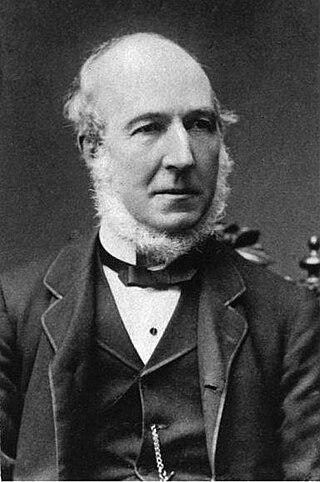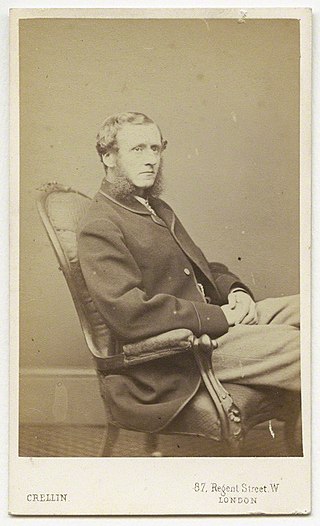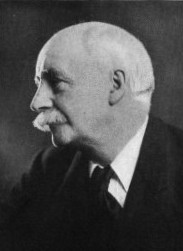
Isidore Auguste Marie François Xavier Comte was a French philosopher, mathematician and writer who formulated the doctrine of positivism. He is often regarded as the first philosopher of science in the modern sense of the term. Comte's ideas were also fundamental to the development of sociology, with him inventing the very term and treating the discipline as the crowning achievement of the sciences.

Frederic Harrison was a British jurist and historian.
The positivist calendar was a calendar reform proposal by Auguste Comte in 1849. Revising the earlier work of Marco Mastrofini, or an even earlier proposal by "Hirossa Ap-Iccim", Comte developed a solar calendar with 13 months of 28 days, and an additional festival day commemorating the dead, totalling 365 days.

Sir Patrick Geddes was a Scottish biologist, sociologist, Comtean positivist, geographer, philanthropist and pioneering town planner. He is known for his innovative thinking in the fields of urban planning and sociology. His works contain one of the earliest examples of the 'think globally, act locally' concept in social science.

Benjamin Constant Botelho de Magalhães was a Brazilian military officer and political thinker. Primarily a positivist, influenced heavily by Auguste Comte, he was the founder of the positivist movement in Brazil, and later this led to his republican views. He left the Brazilian Positivist Society because of internal disagreements, but remained an ardent pupil of Comte until the end of his life.

Marshal Cândido Mariano da Silva Rondon was a Brazilian military officer most famous for his telegraph commission and exploration of Mato Grosso and the western Amazon basin, as well as his lifelong support for Indigenous Brazilians. He was the first director of Brazil's Indian Protection Service or SPI and supported the creation of the Xingu National Park. The Brazilian state of Rondônia is named after him.

The London Positivist Society was an atheistic philosophical, humanist, and political circle that met in London, England, between May 1867 and 1974. The conditions of membership originally included "emancipation from theology and metaphysics and the acceptance of Comte's views on science and society". The Society's members occupied themselves in applying the ideas of the philosophical school of Comtean positivism to current affairs of the day, including the movement for home rule in Ireland, the Second Boer War, the strikes of London trade unionists, Egyptian Independence, the Indian independence movement and defence of the Paris Commune. Among their writings was the 1896 pamphlet Positivist Comments on Public Affairs. The Society also supported the founding of the Sociological Society of London. In 1934, it was renamed the English Positivist Committee.

Richard Congreve was the first English philosopher to openly espouse the Religion of Humanity, the godless form of religious humanism that was introduced by Auguste Comte, as a distinct form of positivism. Congreve was the first thinker to offer a systematic policy, on positivist lines, to dismantle the British Empire. In 1859, after issuing controversial anti-imperialist pamphlets on Gibraltar and India, he delivered his 'first sermon' as a Positivist apostle and 'vicar' of the Religion of Humanity. He later founded the London Positivist Society in 1867 and, after a schism with his closest followers in 1878, he broke off to formally found the Comtist Church of Humanity.

Pierre Laffitte was a French positivist philosopher.

Edward Spencer Beesly was an English positivist, trades union activist, and historian.

Positivism is a philosophical school that holds that all genuine knowledge is either true by definition or positive – meaning a posteriori facts derived by reason and logic from sensory experience. Other ways of knowing, such as intuition, introspection, or religious faith, are rejected or considered meaningless.

Raimundo Teixeira Mendes was a Brazilian philosopher and mathematician. He is credited with creating the national motto, "Order and Progress", as well as the national flag on which it appears.

Religion of Humanity is a secular religion created by Auguste Comte (1798–1857), the founder of positivist philosophy. Adherents of this religion have built chapels of Humanity in France and Brazil.

The New Paul and Virginia, or Positivism on an Island is a satirical dystopian novel written by William Hurrell Mallock, and first published in 1878. It belongs to the wave of utopian and dystopian literature that characterized the later nineteenth century in both Great Britain and the United States.
A General View of Positivism is a 1848 book by the French philosopher Auguste Comte, first published in English in 1865. A founding text in the development of positivism and the discipline of sociology, the work provides a revised and full account of the theory Comte presented earlier in his multi-part The Course in Positive Philosophy (1830–1842). Comte outlines the epistemological view of positivism, provides an account of the manner by which sociology should be performed, and describes his law of three stages.
Shapland Hugh Swinny was an Irish economist and Comtean positivist.

Frederick James Gould was an English teacher, writer, and pioneer secular humanist.
Fabien Magnin was President of the Positivist Society.
Henry Crompton (1836–1904) was an English court clerk and barrister, known as an advocate of positivism and trade unions.
Meşveret was a bimonthly magazine which existed between 1895 and 1898. Published in Paris the magazine was the first official organ of the Committee of Union and Progress (CUP) and was subtitled as “the media organ of the Ottoman Committee of Union and Progress". Its motto was ordo et progrès.














